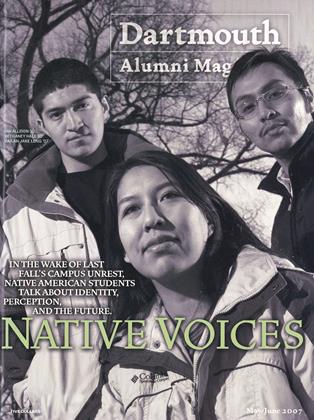CROSBY HALL Dr. Dixi Crosby, who for 35 years lived in a building that's now the four-columned facade of the Blunt Alumni Center, achieved early fame by introducing the campus to ether, which made it much less painful for students to go under the knife.
It was his tinkering with another liquid, rock oil, that had a more lasting—and global—impact.
In 1853 Crosby, who grew up in Hanover and earned a medical degree from Dartmouth in 1824 despite never earning a B.A. anywhere, was paid a visit by his nephew Albert Crosby, class of 1848. The younger Crosby handed his uncle a container of a mysterious black substance he'd collected in western Pennsylvania, where it pooled in rivers and oozed from the ground.
Native Americans and early settlers had rubbed "Seneca Oil" on their skin to soothe arthritis and rashes, but Crosby had another use in mind: illumination. Firing up the sample in his home lab, he discovered that the oil, with some minor adjustments, was a worthy substitute for oil from whales, which were be- coming nearly extinct because of over-hunting in the era of oil lamps.
By 1855 Crosby's eureka moment had led to the formation of the Pennsylvania Rock Oil Cos., which drilled deep holes in 200 acres of land it bought outside Titusville Pennsylvania. On August 27, 1859, oil finally gushed from one of them. A new era in energy had begun.
Today Crosby, who died in 1873, is noted on a small plaque on his former home's exterior brick wall.
 View Full Issue
View Full Issue
More From This Issue
-
 Cover Story
Cover StoryNative Voices
May | June 2007 By CATHERINE FAUROT, MALS’05 -
 Feature
FeatureHostile Takeover
May | June 2007 By MARY SEYMOUR AND ANDREW MULLIGAN ’05 -
 Feature
FeatureA Different Kind of Homeland Security
May | June 2007 By JAMIE HELLER ’89 -
 Feature
FeatureNotebook
May | June 2007 By JOHN SHERMAN -
 Feature
FeatureAlumni News
May | June 2007 By Joe Novak '52 -
 PERSONAL HISTORY
PERSONAL HISTORYThe Pursuit of Happiness
May | June 2007 By Daniel Becker ’84
C.J. Hughes ’92
-
 Article
ArticleHALLS OF NAME
Sept/Oct 2007 By C.J. Hughes ’92 -
 Article
ArticleHALLS OF NAME
Sept/Oct 2008 By C.J. Hughes ’92 -
 Cover Story
Cover StorySupply & Demand
July/Aug 2010 By C.J. Hughes ’92 -
 Feature
FeatureThe World According to Neel
Jan/Feb 2012 By C.J. Hughes ’92 -
 HISTORY
HISTORYTies that Bind
May/June 2013 By C.J. Hughes ’92 -
 Features
FeaturesOverboard
SEPTEMBER | OCTOBER 2021 By C.J. Hughes ’92
Article
-
 Article
ArticleTHE MAY CONFERENCE OF TEACHERS
April, 1909 -
 Article
ArticleAnn Hopkins To Marry
October 1939 -
 Article
ArticleTransportation Wizard
March 1945 -
 Article
ArticleFaculty Articles
December 1945 -
 Article
ArticleConferences, Concerts Scheduled for Summer
July 1954 -
 Article
ArticleVARSITY CROSS COUNTRY
DECEMBER 1967 By ALBERT C. JONES '66

